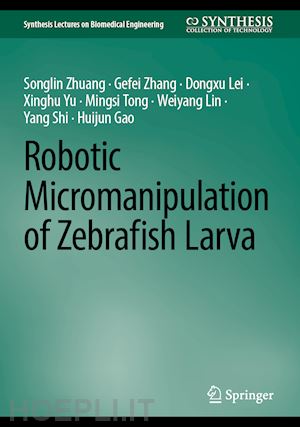
Questo prodotto usufruisce delle SPEDIZIONI GRATIS
selezionando l'opzione Corriere Veloce in fase di ordine.
Pagabile anche con Carta della cultura giovani e del merito, 18App Bonus Cultura e Carta del Docente
This book offers readers a series of robotic methods for manipulating zebrafish larva, one of the most popular model vertebrates widely used in biomedical research and clinical applications. The authors leverage advanced control theories, image processing algorithms, and artificial intelligence to establish a robot-assisted automated or semi-automated zebrafish larva-targeted micromanipulation system for different experimental purposes. The methods presented are generic and can be translated to manipulate other types of biological objects, such as embryos or cells. Coverage includes topics that span the procedures of manipulating zebrafish larva, such as in-plane positioning, three-dimensional orientation, deformation-controllable immobilization, organ-targeted microinjection, whole-organism imaging, and high-throughput trajectory tracking of zebrafish larvae group movement.
Robotic Micromanipulation of Zebrafish Larva is written in a simple, clear, and easy-to-read style. It is an ideal reference for academic researchers and biomedical operators. It is also a valuable resource for students learning robotics, control and system theories, image processing, artificial intelligence, and biomedical engineering.
Songlin Zhuang received a B.E. in automation and a Ph.D. in control science and engineering from the Harbin Institute of Technology, China, in 2014 and 2019, respectively. From 2019 to 2020, he was a Postdoctoral Researcher with the Department of Mechanical and Industrial Engineering at the University of Toronto, Canada. Since October 2020, he has been a Postdoctoral Fellow with the Department of Mechanical Engineering at the University of Victoria, Canada. Dr. Zhuang’s research interests include robotic micromanipulation with biomedical and clinical applications and control theories with industrial applications.
Gefei Zhang received a B.E. degree and Ph.D. in control science and engineering from the Harbin Institute of Technology, China, in 2016 and 2022, respectively. He is currently an Assistant Professor with the Research Institute of Intelligent Control and Systems at the Harbin Institute of Technology. His research interests include robotic micromanipulation, image processing, and adaptive robust control.
Xinghu Yu received an M.M. in osteopathic medicine from Jinzhou Medical University, China, and a Ph.D. in control science and engineering from the Harbin Institute of Technology, in 2016 and 2020, respectively. He is currently the Chief Executive Officer of the Ningbo Institute of Intelligent Equipment Technology Co., Ltd., China. He has authored over ten technical papers for conference proceedings and refereed journals, including the IEEE Transactions journals, and has over 20 invention patents. His research interests include switched systems, intelligent control, and biomedical image processing.
Dongxu Lei received a B.E. degree in automation and an M.E. degree in control science and engineering from the Harbin Institute of Technology, Harbin, China, in 2018 and 2020, respectively, where he is pursuing a Ph.D. in control science and engineering. His research interests include image processing, data analysis, and control theory.
Mingsi Tong received a Ph.D. in mechatronic engineering from the Harbin Institute of Technology, Harbin, China, in 2016. He also concurrently studied at the National Institute of Standards and Technology, Washington, DC, USA, as a Guest Researcher during his graduate studies. He is an Associate Professor at the School of Mechatronics Engineering, Harbin Institute of Technology. His research interests include machine vision, pattern recognition, and surface metrology.
Weiyang Lin received B.S., M.Sc., and Ph.D. degrees in mechanical engineering from the Harbin Institute of Technology, Harbin, China, in 2006, 2008, and 2014, respectively. He is an Associate Professor with the Research Institute of Intelligent Control and Systems, Harbin Institute of Technology. His research interests include parallel manipulators, robotic motion control, and visual servo control.
Yang Shi received B.Sc. and Ph.D. degrees in mechanical engineering and automatic control from Northwestern Polytechnical University, Xi'an, China, in 1994 and 1998, respectively, and a Ph.D. in electrical and computer engineering from the University of Alberta, Edmonton, AB, Canada, in 2005. From 2005 to 2009, he was an Assistant Professor and Associate Professor in the Department of Mechanical Engineering at the University of Saskatchewan, Saskatoon, SK, Canada. In 2009, he joined the University of Victoria and is now a Professor in the Department of Mechanical Engineering, University of Victoria, Victoria, BC, Canada. His current research interests include networked and distributed systems, model predictive control (MPC), cyber-physical systems (CPS), robotics and mechatronics, navigation and control of autonomous systems (AUV andUAV)











Il sito utilizza cookie ed altri strumenti di tracciamento che raccolgono informazioni dal dispositivo dell’utente. Oltre ai cookie tecnici ed analitici aggregati, strettamente necessari per il funzionamento di questo sito web, previo consenso dell’utente possono essere installati cookie di profilazione e marketing e cookie dei social media. Cliccando su “Accetto tutti i cookie” saranno attivate tutte le categorie di cookie. Per accettare solo deterninate categorie di cookie, cliccare invece su “Impostazioni cookie”. Chiudendo il banner o continuando a navigare saranno installati solo cookie tecnici. Per maggiori dettagli, consultare la Cookie Policy.